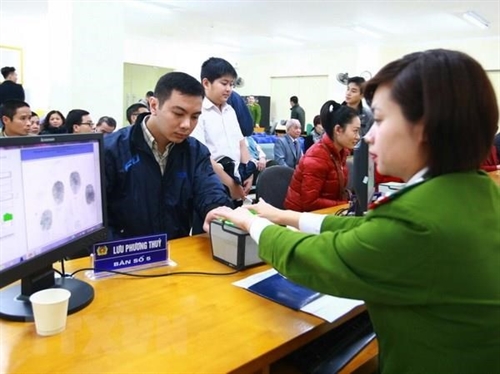Chip-based ID cards proposed to improve compatibility with e-Government
Major General To Van Hue, head of the Department for Administrative Management of Social Order under the Ministry of Public Security told local media about the ministry’s plans to introduce chip-based identity cards.
Page Content
Why does the Public Security propose chip-based identity cards at this time?
Currently, Vietnamese citizens are using either nine-digit ID cards, 12-digit ID cards or the ID cards with 2D barcode. The latest kind of ID was introduced in 2016 but until now, only available in 16 cities and provinces nationwide including Hanoi, Vinh Phuc, Hung Yen, Hai Duong, Ha Nam, Nam Dinh, Ninh Binh, Thai Binh, Hai Phong, Quang Ninh, Thanh Hoa, HCM City, Can Tho, Tay Ninh, Ba Ria-Vung Tau and Quang Binh.
The issuance of 2D bar code ID has faced difficulties including cost.
The Ministry of Public Security wants to speed up the project on ID issuance so to bring it in line with the national database population project. Under the project, as of July 1, 2021, 50 million ID cards would be granted to eligible citizens. (The Law on Citizen Identification in 2014 stipulates that people from 14 years old are eligible to get an ID card and it will be renewed when they turn to 25, 40, and 60 years old.)
 |
| A man has fingerprinting scanned when applying for a new ID card__Photo: VNA |
On the back of valid ID cards in Vietnam, personal information is posted while with the latest form of ID cards, the information is coded under 2D-barcode.
However, studies found that the 2D bar code fails to add more information into the ID cards or implement online transactions under the e-Government system that Vietnam is deploying.
So, the Public Security Ministry proposed Government to issue chip-based ID cards.
When Vietnam introduced 12-digit ID cards in 2012, electronic chips were expensive and the country faced difficulties to master the technology.
However, now, electronic chips are much cheaper and Vietnamese companies can produce the chips. E-chips have more advantages than the barcodes, especially as the chips could store the data that not only serves public security sector but also other sectors.
As the chips are widely used all over the world and more suitable to e-Government, the ministry of Public Security proposed to apply this form of identification.
How does the ministry prepare for the issuance of chip-based ID cards?
So far, the ministry submitted the proposal to Government. Once the proposal is approved with proper funding disbursed, further preparations will be made. The ministry expects to start granting the chip-based ID cards from November this year across the country.
What technology will be used to make the chip-based ID cards?
We are considering options. The Public Security Ministry’s leaders asked for 50 million ID cards to be issued by July next year. If we buy equipment, install software programs and make the cards ourselves, funding will be higher because we will have to buy equipment at the same time. It will also generate waste as part of the equipment would become unused as on average, only four million people apply to get ID cards yearly including those who are 14 years old and those required to renew their ID cards.
In another option, we recommend the Government allow us to hire equipment and hire qualified companies to print the ID cards.
If chip-based ID cards begin to be issued from November, should all citizens change their in-use ID cards immediately?
Not necessarily. Citizens can continue using their current ID cards and will change them when they expire.
To save State’s funding and avoid annoyance to citizens, we asked police in 16 localities to tell people avoid changing ID cards if it is not urgent.
Please wait until the new form of ID cards is approved so that we can help save State’s resource as well as avoid inconvenience when re-applying for ID cards in the near future.
However, if people urgently need a new ID cards at this time, the issuance is still done as usual.- (VNS/VLLF)